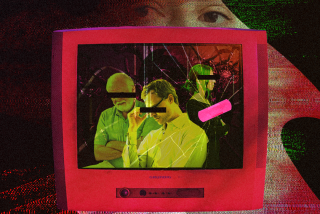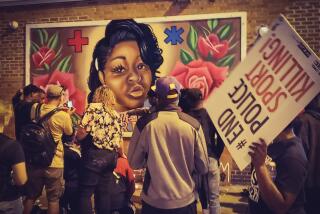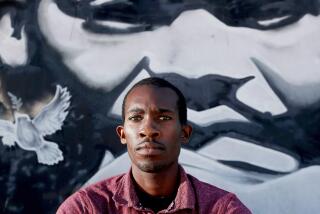Reflections on Outrage in the Street : A racial confrontation leads two women down different paths of shock, indignation and understanding.
- Share via
The man took a quick deep breath, aimed and spat on us. The spittle ricocheted off the right shoulder of my leather jacket and landed, full-bodied and glistening, in Stacy’s long, wavy hair.
With no tissue between us, we were forced to wear it, like a brooch and a barrette. And by the time we arrived at our destination, it had dried.
A full year later, I now realize how different my reaction was to this event, compared with the reaction of my friend Stacy, perhaps telling about the complicated nature of race relations. The man was African-American, Stacy is Polish-American and I am Chinese-American.
The incident happened last May. The atmosphere in New York City was electric, rife with rumor and fear. You could feel it everywhere. It was a few days after the acquittal in the Rodney King beating trial. Los Angeles was burning, and New York was nervous.
I was working part-time, selling kimonos in a boutique. On my way to lunch, sales people and store owners were standing outside, looking worried, facing midtown, the Chrysler Building in the distance.
“They are shooting at police helicopters,” one person told me.
“I heard they were rioting inside Madison Square Garden,” another said.
“We’re closing early,” several people told me. “Not so much that they’ll come here, but some of us have to get home.”
They who? Who were they? I went back to the store and listened to the radio. Announcers on several stations reported in. No one was shooting at police helicopters. The subway stations, the major thoroughfares of the city had not shut down. There was, indeed, a skirmish at Madison Square Garden, but it was minor case of vandalism, no one injured.
Rumor had spread like wildfire, by word of mouth, by fax, by telephone. Stacy called and told me that everyone at her law office was going home early. I
told her I was still going to Jennifer’s art opening. No slave to fear and rumor, are we? She agreed to come along.
Stacy is your basic good egg: a master’s degree in liberal arts, kind to animals, loves babies. She looks into the eyes of street people, tries to see all points of view, likes ethnic foods and ethnic men. Raphael or Botticelli might have painted her flowing blonde hair, her aristocratic nose, her dreamy far-off expression.
As we walked down Broadway, the black man approached. He appeared raggedy, with a stubby graying beard and shabby oversized sports coat. He was muttering to himself. And as he approached, Stacy--uncharacteristically--whispered, “Maybe we should cross the street?” But before I could consider the suggestion, the man scooted toward us and spat. “Whitey. Chink,” he said. And moved on.
Stacy burst into tears. I looked for a tissue.
“How could he do that?” she said. “How dare he do that? He just judged us like that, based on our color. He doesn’t know me. I give money to guys like that. I smile and say hello to guys like that.”
I listened. I didn’t cry. I wasn’t outraged. Where was my outrage?
I was thinking about getting to the reception, and about the last time someone spat on me. On a San Francisco street, ages ago, an old Chinese man, also with a stubby graying beard and shabby clothing, spat and called me a whore as I walked hand-in-hand with blond, blue-eyed Oliver.
I cried then. I was outraged then.
But now, it doesn’t shock me. I have been refused service in restaurants. I have lost promotions. I have been underestimated as an artist and overlooked as a potential marital mate, solely because of my color.
The converse also has been true. I have had preferential treatment in restaurants, gotten jobs, been touted as an artist and sought by men as desirable, solely based on the color of my skin.
True, the content of my character or the integrity of my actions are, thankfully, sometimes factored in. But on the whole, no one has given me anything or taken something away without considering my race. Nothing has come to me solely on merit. I have learned to accept this as a fact of my life. I couldn’t be angry at the man who spat at me. I knew he had been asking “How dare they?” all his life. I had been socialized to accept inequities, but someday, might I reach a boiling point too? Might I lash out? Spit?
Stacy was still in shock. “How can you be so calm?” she asked. “What’s the matter with you? It’s not like stuff like this happens every day.”
“Oh really?” I replied.
Stacy was silent. After awhile, she stopped, held me by the arm, and said, “Stuff like this happens all the time to people of color, doesn’t it? I’m privileged, in a way, aren’t I? Stuff like this happens all the time, especially if you’re black. Am I right? That’s why people are in the streets in L.A., right?”
Stacy composed herself. We looked at some good paintings and talked about art as we walked home. The streets were quiet, littered with glass from storefront windows broken during a solidarity march that day.
Stacy and I never spoke of the incident again.
More to Read
Sign up for Essential California
The most important California stories and recommendations in your inbox every morning.
You may occasionally receive promotional content from the Los Angeles Times.













